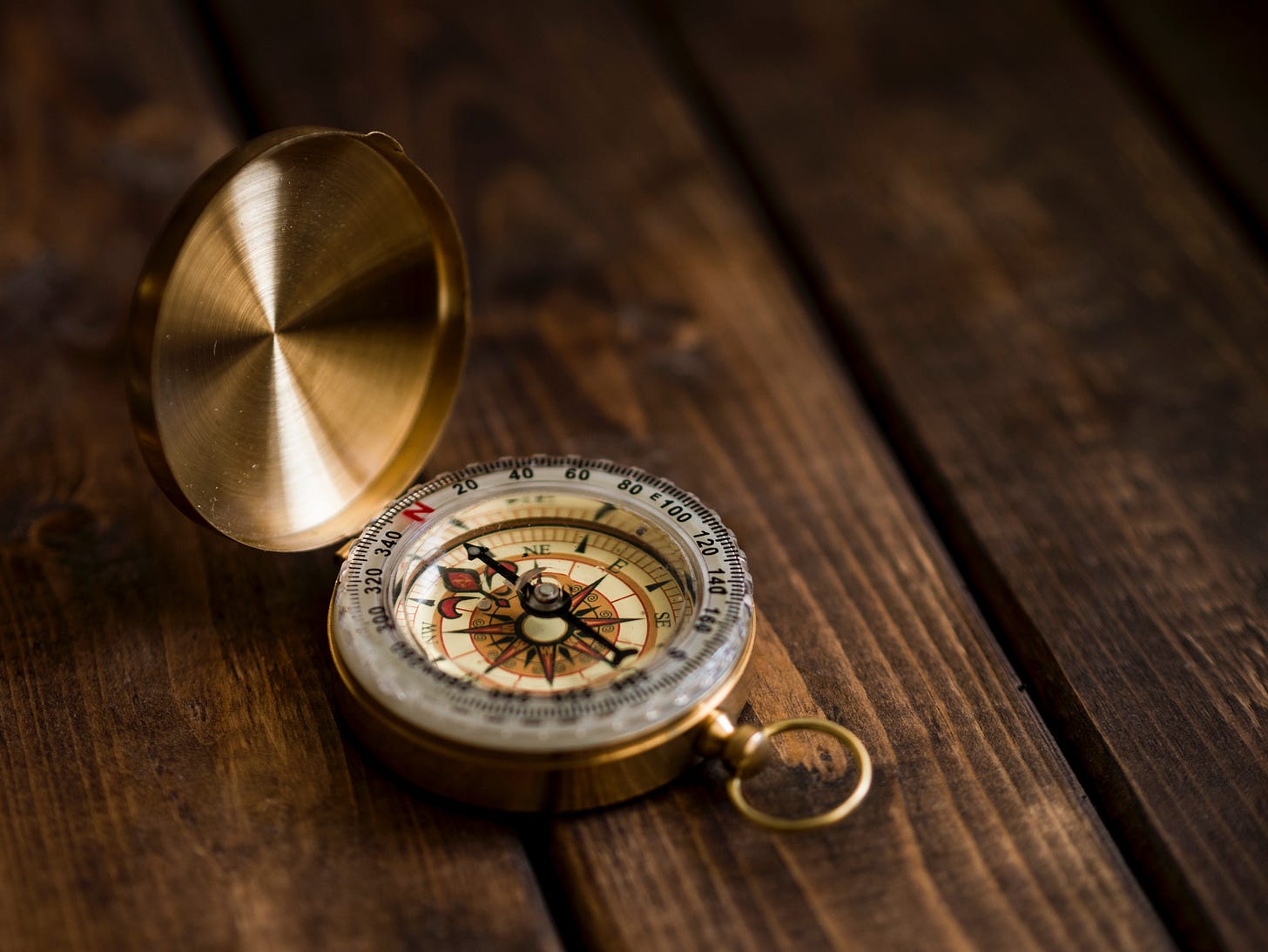On Staying the Path
Keep calm and transcend your limitations
Welcome to Mind Voyage fellow explorer🎉
My aim is to share with you a consistent dose of mind-enhancing content.
Subscribe here to level up:
At certain times in life, we reach a turning point. A period of intense difficulty in our attempt to better ourselves.
As we reach our limit we’re faced with a choice:
Retreat into the safety of what we know.
Or persist through new uncharted territory.
This article is targeted at people who choose the uncharted terrain of potential. The people who stay on the path.
Our aim is not simply to survive on this path but to use it to transcend our current limitations into a much better future.
These are tactics that I’ve found useful on my journey. They’ve helped me come back from isolation, depression, and poverty.
It’s my hope that they help you too.
Tactics for staying on the path
Keep a journal
To write is to think.
I’ve found that processing emotions and problems on paper improve their resolution faster than thinking about them in my head because many times these scenarios are complicated.
For example, if I asked you:
What’s 15 x 3?
You’d shoot 45 as the answer in no time. This is the equivalent of quickly handling a simple emotion or problem.
The trouble sets in when I add more complexity:
What’s 177 X 3?
An answer doesn’t easily jump out, does it?
Now try doing this calculation on paper…I’ll wait.
…
If you did it, you understand that the difference between solving a problem on paper and in your head is as clear as night and day.
As Einstein once said:
“My pencil and I are more clever than I.“
It’s like your brain has RAM like a computer and you can only do so much in your head before it crashes.
If it’s so hard to solve a simple multiplication problem in your head, consider how much harder it must be to solve complex life issues.
So next time you’re in a confusing bind and you want to think your way out of it. Stop. Grab a pen and your journal. Then write down everything you’re thinking on the page.
It’s amazing how freeing this is.
Journaling, this act of processing your thoughts on paper is like giving your brain more RAM. Journaling not only helps you think through situations but also teaches you about yourself.
I write about everything in my journal. You can cover goals, feelings, challenges, dreams—and the more you write the clearer your think.
A powerful thing happens when you start journaling regularly. You start to solve problems faster not just because you can now think on paper but because you become more familiar with yourself. Decisions are easier to make and you see the solution to problems faster.
Always be learning
When you’re explaining something to someone and they tell you it’s too risky or dangerous. Realize that while they might be right about the risk involved, there isn’t really any situation without danger.
Driving a car is dangerous—if you don’t know how to drive.
Swimming is deadly—unless you’ve learned how to swim.
The fact that people do these must mean that danger/risk is subjective. What determines risk is how competent you are in that area.
To a trained pilot, flying a plane is another Monday. To an ordinary person it would be instant destruction.
“A situation is only ever as dangerous as you are incompetent.“
It’s never that something is too dangerous to do but really how well you can mitigate your risk by being extremely competent in that area.
On your path, in order to reduce risk and suffering, you must be as competent as possible. This requires you to be a constant learner. You must cultivate the habit of becoming 1% better every day.
The modern human has to be a learning machine or become irrelevant in an information-saturated world. The only way to thrive in the new world is to learn constantly.
Stay mindful
Our perceptions are powerful things. Panic induces more panic. When you’re on the hard road and it feels like there aren’t any breaks and you want to cry most days.
Be mindful of why you’re doing this in the first place. There’s a reason why you chose the uncharted terrain. Something inside of you called out the possibility that you can be more. You’ve got to keep in mind that all emotions, including suffering, are impermanent.
For example, take a moment to remember the most difficult period of your life 4 years ago. No really, think about it.
If you’re like most people, the problem probably seems so small now. And though it might hurt to think about, the pain has mostly faded. This is the fate of all your current problems and emotions.
What I find encouraging is that while the pain eventually fades. The progress you made as a result of the pain remains. Everything you learned during this process stays with you.
When you face difficult moments and survive them you come out stronger than ever. You’re now more capable than you were before and might even be thankful for the difficulty.
Trust the process
I’ve been through enough transition points in my life to know that when you’re at your limit one of your greatest obstacles will be self-doubt.
It’s human to doubt. As you practice mindfulness and journaling, these become like mental armor shielding you from the negativity of your surrounding. But it’s only human to let our shields down at our worst moments.
When self-doubt sets in. When you start to believe that maybe you were just too arrogant to believe you could ever live your dream life. That maybe those who doubted you were right…you have to find something strong to anchor you.
Something that strengthens your belief.
For me, I’ve always been empowered by the Theory of Progress.
To quote David Deutsche:
“Nor was it arrogance that prevented people from realizing their mistake for so long…In a sense their whole problem was that they were not arrogant enough: they assumed far too easily that the world was fundamentally incomprehensible to them.”
When things go wrong we tend to think that maybe we’re not smart enough, good enough, or maybe fate just doesn’t have it in our cards.
But David’s point and the story of human progress—how we’ve come from hunter-gathers to space traveling monkeys—is that infinite progress is possible.
We as individuals and society can instrument drastic change by seeking better explanations. And anything not directly against the laws of physics is possible by definition.
This includes making Mars habitable as much as it does starting a successful small business.
When we fail it is never that it wasn’t meant to be but simply that we did not know enough. We only have to seek better explanations to succeed.
Be mindful of the fact that your present only shows the outcome of your past. If you’ve been grinding for a while and haven’t seen any results then your progress simply hasn’t caught up yet.
What you’re currently doing NOW will dictate the state of your future.
This leads to my next point…
Cultivate extreme focus
When you choose to walk the uncharted territory, the only way to make it through to the other side is to cultivate extreme focus.
In 1979 a passenger jet carrying 257 people left New Zealand for a sightseeing flight to Antarctica and back. By some accident, there was a minor 2-degree error in their flight coordinates. This error resulted in the aircraft being 28 miles to the east of where the pilots were supposed to be. The 2-degree error placed them directly in the path of Mount Erebus, an active volcano. The plane crashed into the side of the volcano and no one was left alive.
This tragic story illustrates how minor deviations can have devastating effects in the long run. Sometimes the little things you think don’t matter, matter greatly.
They pull you slightly of course and before you know it you’re miles from your intended target. To stay on the path requires you to constantly course-correct. You have to frequently gauge whether you’re still on track.
Fix the minor deviations before they throw you completely off.
An exercise I like to use that forces extreme focus is something called “Death bed mentality”.
It starts with a question:
“What would you do if you only had 6 months to live?”
What suboptimal things would you eliminate from your life? How many hours a day would you spend on social media?
How long would you sit feeling sorry for yourself? How shameful would reaching out to that mentor be? Or quitting your job to start a new career?
In the face of death, all challenges lose their teeth. And we default to doing only things that maximize meaning in our lives.
Staying on the path is difficult. And the longer you stay on it, especially when you haven’t succeeded yet, the more difficult it becomes.
But as humans, our reward systems are mediated by dopamine which is primarily motivational rather than acquisitional.
You experience the most meaning in the pursuit of a goal than you do in its actualization. The reward literally is in the doing.
Stay on the path. Remember why you chose this life.
Keep calm and transcend your limitations.
Then do it all over again.
P.S - Related links : )
Beginning of Infinity by David Deutsch
Smile by Nat King Cole
Jordan Peterson on Potential - TEDx








